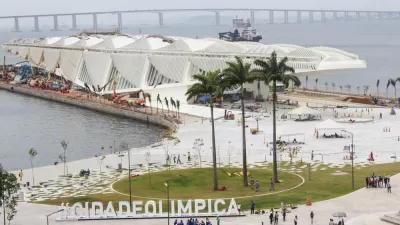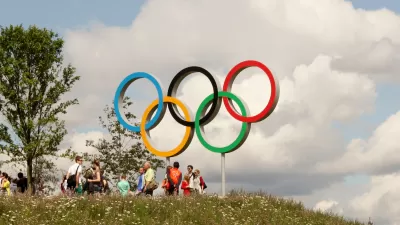The Olympics can be awesome for cities. Or they can be devastating. Rarely they're both, and most often they are an economic drain caused by over-investment in facilities with limited long-term usability. So when London's plans for a 2012 Summer Olympics stadium that would reduce from 80,000 seats during the games to a more realistically usable 25,000 seats after, Olympics experts, city officials and taxpayers rejoiced. But recent news has turned that rejoice to disgust.
The Olympics can be awesome for cities. Or they can be devastating. Rarely they're both, and most often they are an economic drain caused by over-investment in facilities with limited long-term usability. So when London's plans for a 2012 Summer Olympics stadium that would reduce from 80,000 seats during the games to a more realistically usable 25,000 seats after, Olympics experts, city officials and taxpayers rejoiced. But recent news has turned that rejoice to disgust.
London Olympics officials are now flipping a sharp U-turn, calling to revise plans for the stadium to keep the 80,000 seats permanently. Margaret Ford, the new head of the Olympic legacy team, is confident the stadium will be able to pull in crowds all year, and is leading the charge to make permanent what has for years been designed as temporary.
In fact, the stadium is already under construction. This late-stage program change is bound to throw a wrench into the renderings of designer Populous (formerly HOK Sport).

The inspiration behind this seemingly ill-minded turnaround is actually a big gamble. Ford is looking at the London stadium as a possible host site for the soccer World Cup, which England is vying to host in either 2018 or 2022. The decision about who hosts the 2018 competition announced in December 2010. Though many feel England will be a likely contender for either of the World Cups, those events, like the Olympics, are relatively short.
Filling 80,000 seats for a couple of weeks during the Summer Olympics in 2012 and another month in 2018 or 2022 will be no problem. In fact, those seats will likely sell out. But what about the 6-10 years in between? And what about the decades to follow?
Other Olympic host cities have fallen in to deep debt and regret because of their super-big Olympics projects, most notably Athens. After hosting the 2004 Summer Olympics, the Greek city is struggling to find uses for its Olympic venues. Its main stadium was remodeled for millions of dollars, and though it serves as home field for a local soccer team and sometimes host to concerts, it has still saddled the city deep with bills.
Similarly, the iconic Bird's Nest stadium from last summer's Beijing Olympics is posing usage problems for the city. Few events have taken place in the stadium since the end of the games last year, and officials there are trying to figure out how to get more events planned and people visiting. One idea has been to convert parts of the stadium to a shopping mall.
The challenges are immense. And while the short-term payoff might seem worthwhile, once these sporting events pack up, the infrastructure remains -- and so does its cost. Creating a real legacy for London should look beyond these high-profile-but-temporary events and towards to future of the city. A good place to begin might be the lessons that past Olympics hosts have been unfortunate to learn.

Alabama: Trump Terminates Settlements for Black Communities Harmed By Raw Sewage
Trump deemed the landmark civil rights agreement “illegal DEI and environmental justice policy.”

Study: Maui’s Plan to Convert Vacation Rentals to Long-Term Housing Could Cause Nearly $1 Billion Economic Loss
The plan would reduce visitor accommodation by 25% resulting in 1,900 jobs lost.

Planetizen Federal Action Tracker
A weekly monitor of how Trump’s orders and actions are impacting planners and planning in America.

Wind Energy on the Rise Despite Federal Policy Reversal
The Trump administration is revoking federal support for renewable energy, but demand for new projects continues unabated.

Passengers Flock to Caltrain After Electrification
The new electric trains are running faster and more reliably, leading to strong ridership growth on the Bay Area rail system.

Texas Churches Rally Behind ‘Yes in God’s Back Yard’ Legislation
Religious leaders want the state to reduce zoning regulations to streamline leasing church-owned land to housing developers.
Urban Design for Planners 1: Software Tools
This six-course series explores essential urban design concepts using open source software and equips planners with the tools they need to participate fully in the urban design process.
Planning for Universal Design
Learn the tools for implementing Universal Design in planning regulations.
Caltrans
Smith Gee Studio
Institute for Housing and Urban Development Studies (IHS)
City of Grandview
Harvard GSD Executive Education
Toledo-Lucas County Plan Commissions
Salt Lake City
NYU Wagner Graduate School of Public Service




























